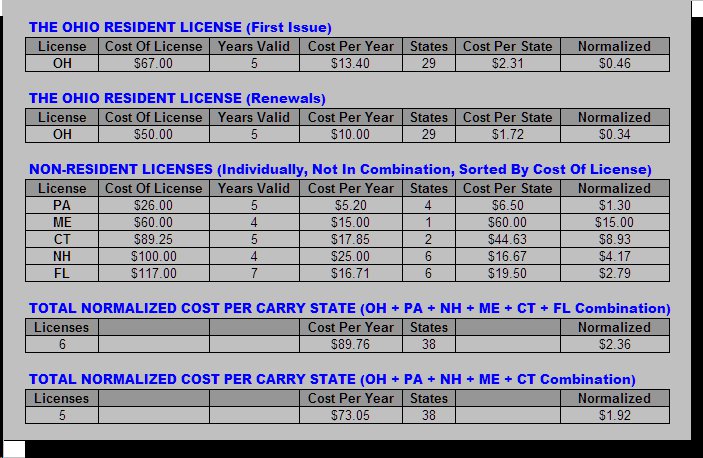How these non-resident licenses compare
Editor's Note, September 2010: Laws and rules change. While the author sought to ensure accuracy at the time this article was published, it is incumbent upon the reader to verify any potential changes since then.
IMPORTANT NOTE: This article is no longer being updated by the author and will become increasingly out-dated.
Each of the licenses discussed varies by outright cost, number of years for which it is valid, and number of additional states the license can provide to an Ohio licensee. As such, some direct comparisons are easier than others. To aid with additional comparisons, it helps to get at least one metric in common, for all of them.
To do this, the tables above provide a "normalized" cost. This is the cost of the license, divided by the number of years for which the license is valid, further divided by the number of additional states the license provides. In effect, the normalized cost is the "cost per license, per year, per state offered."
Should any of the licensing states introduce legislation that changes fees, years valid, or honored states, the numbers will of course change, but the technique of "normalizing" to a single common metric will still provide for direct, valid comparisons.
As we can see, if comparing solely based on out-of-pocket cost for each application, without regard to how long the license is valid, or how many (or which) states are offered by a given non-resident license, the clear winner is Pennsylvania ($26), followed by Maine ($60), Connecticut ($89.25), New Hampshire ($100), and finally Florida ($117).
If comparing solely based on the number of additional states offered by each individual non-resident license, without regard for cost or which particular states are covered, the order of preference changes thus: Florida and New Hampshire are tied for 1st place, offering 6 states a piece (though they are not the same 6 states).
Pennsylvania is 2nd, with 5 states gained. Connecticut is 3rd, with 2, and Maine is 4th, at just 1 state gained.
On the basis of "cost per number of additional states" in which the licensee can legally carry, discounting licensing fees or number of years the license is valid, the best "bang for the buck" is Pennsylvania, at $26 for a 5 state gain, or $5.20 per additional state. New Hampshire takes second at $100 for a 6 state gain, or $16.66 per additional state. A New Hampshire non-resident license is also the only non-resident license accepted in NH. They don't need to honor other states' non-resident licenses since they offer one of their own to any licensee of any state.
Florida, falls solidly into third place based on cost per state, at $117 for a 6 state gain, or $19.50 per additional state. This cost gets even higher if you factor in expenses for getting fingerprinted, for the services of a Notary Public, and the cost paid for passport photos.
Connecticut follows at $44.63 per state gained (2), with any costs for passport photos, a notary, and fingerprints driving the cost even higher.
Coming in last is Maine, at $60 for a single-state net gain. Factor in the $9 I paid for passport photos to accompany this application, and the total becomes $69. It's the only option if you are planning on going to Maine, as Maine does not honor any state license but their own. However, just like New Hampshire, they don't need to honor other licenses since they offer one of their own to any licensee of any state.
The number of states gained by each license, however, can be greatly influenced, and the apparent clear winners above, can become just an "also ran," when you begin combining non-resident licenses, as explained next, as more sophisticated comparisons are possible, and warranted.
- 2378 reads







